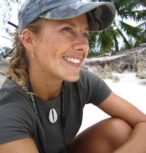DNA reveals the past and future of coral reefs
New DNA techniques are being used to understand how coral reacted to the end of the last ice age in order to better predict how they will cope with current changes to the climate. James Cook Univer

From 2005 to 2022, the main node of the ARC Centre of Excellence for Coral Reef Studies was headquartered at James Cook University in Townsville, Queensland (Australia)








Abstract. Coral reefs in East Africa are increasingly threatened by proximate pressures such as growing, heavily reliant coastal communities, as well as distal threats that include increasing ocean temperatures and coral bleaching. The Oceans Without Borders programme is a new initiative launched as a collaborative effort between &Beyond and The Africa Foundation to address the challenges facing East African marine ecosystems and the communities that depend on them. The scope of the project will span 3000 km of African coastline and 3 countries, extending from Tanzania down to the World Heritage reefs of South Africa’s iSimangaliso Wetland Park, and including linkages with terrestrial systems. Specifically, it encompasses three key islands; Mnemba Atoll in Tanzania, an important turtle nesting site, Vamizi Island in the Quirimbas Archipelago of northern Mozambique, which boasts some of the highest coral and fish diversity in East Africa, and Benguerra Island in central Mozambique, home to one of the last remaining dugong populations in the region. A primary objective of Oceans Without Borders is to strengthen the current conservation status of these islands while enabling community development. This will be achieved primarily through collaborative governance, research partnerships, and concomitant conservation initiatives. Collaborations with academic institutions and scientists will be fundamental to ensuring the success of the Oceans Without Borders programme. We aim to provide the infrastructure necessary to facilitate well-targeted, long-term research projects that will support the sustainable management of these diverse marine ecosystems, and contribute to building capacity in local communities. In this seminar, I will give an overview of the ecological and social characteristics, dynamics, and challenges in the region, with the aim of providing a starting point for conversations about how we can work together to begin addressing them.
Biography. Tessa grew up on a farm in the savannas and escarpment forests of South Africa, an environment that instilled in her a passion for ecology from a young age. After a year in Tasmania as a Rotary Scholar, she began her undergraduate studies via correspondence with the University of South Africa (UNISA) while travelling and working in SCUBA diving. Tessa completed degrees in Botany (BSc.), Zoology (BSc., BSc. Hons), and Conservation Biology (MSc) at the University of Cape Town, before recently completing her PhD in Coral Reef Ecology at the ARC CoE for Coral Reef Studies at James Cook University. During this time, Tessa has investigated study subjects ranging from the impacts of elephants on savanna vegetation, bat community ecology, upwelling system dynamics, crinoid symbionts, the effects of dynamite fishing on coral reefs in Tanzania, and the impacts of habitat degradation on the trophodynamics of coral reef mesopredators. Never one to let her schooling interfere with her education, Tessa has also worked as a conservation manager for the Sustainable Seas Trust (SST), sailed around South America, and worked in a variety of research and management roles in the Indo-Pacific Ocean, including the remote Aldabra Atoll World Heritage Site. In her newest role, Tessa will support marine conservation and research in East Africa as the Project Operations Manager of the Oceans Without Borders programme, working in conjunction with The Africa Foundation and &Beyond.
New DNA techniques are being used to understand how coral reacted to the end of the last ice age in order to better predict how they will cope with current changes to the climate. James Cook Univer
A new study on the effects of climate change in five tropical countries has found fisheries are in more trouble than agriculture, and poor people are in the most danger. Distinguished Profess
James Cook University researchers have found brightly coloured fish are becoming increasingly rare as coral declines, with the phenomenon likely to get worse in the future. Christopher Hemingson, a
Researchers working with stakeholders in the Great Barrier Reef region have come up with ideas on how groups responsible for looking after the reef can operate more effectively when the next bleaching
Abstract: As marine species adapt to climate change, their heat tolerance will likely be under strong selection. Individual variation in heat tolerance and its heritability underpin the potential fo
Abstract: The Reef Ecology Lab in KAUST’s Red Sea Research Center explores many aspects of movement ecology of marine organisms, ranging from adult migrations to intergenerational larval dispersal
Abstract: Macroalgal meadows are a prominent, yet often maligned component of the tropical seascape. Our work at Ningaloo reef in WA demonstrate that canopy forming macroalgae provide habitat for ad
Abstract: Sharks are generally perceived as strong and fearsome animals. With fossils dating back at least 420 million years, sharks are not only majestic top predators but they also outlived dinosa
Abstract: Connectivity plays a vital role in many ecosystems through its effects on fundamental ecological and evolutionary processes. Its consequences for populations and metapopulations have been
Abstract: Evolution of many eukaryotic organisms is affected by interactions with microbes. Microbial symbioses can ultimately reflect host’s diet, habitat range, and even body shape. However, how
Abstract: The past few years have seen unprecedented coral bleaching and mortality on the Great Barrier Reef (GBR) but the consequences of this on biodiversity are not yet known. This talk will expl